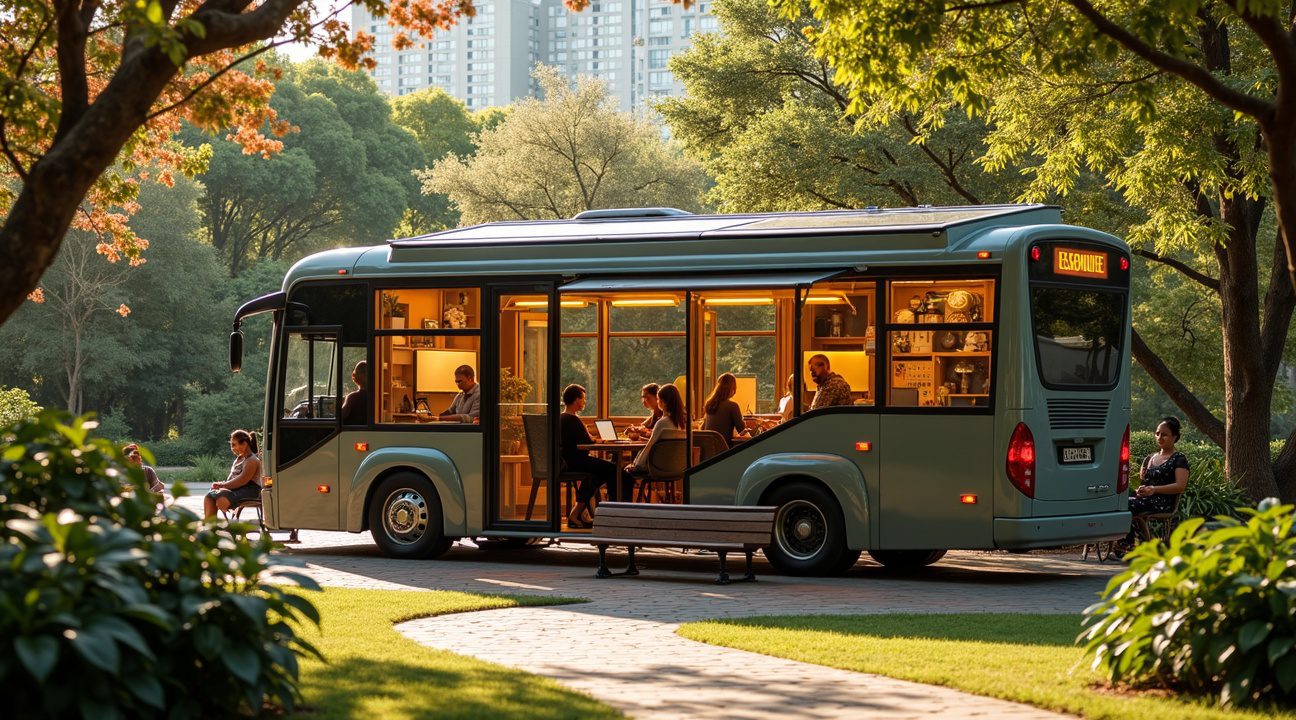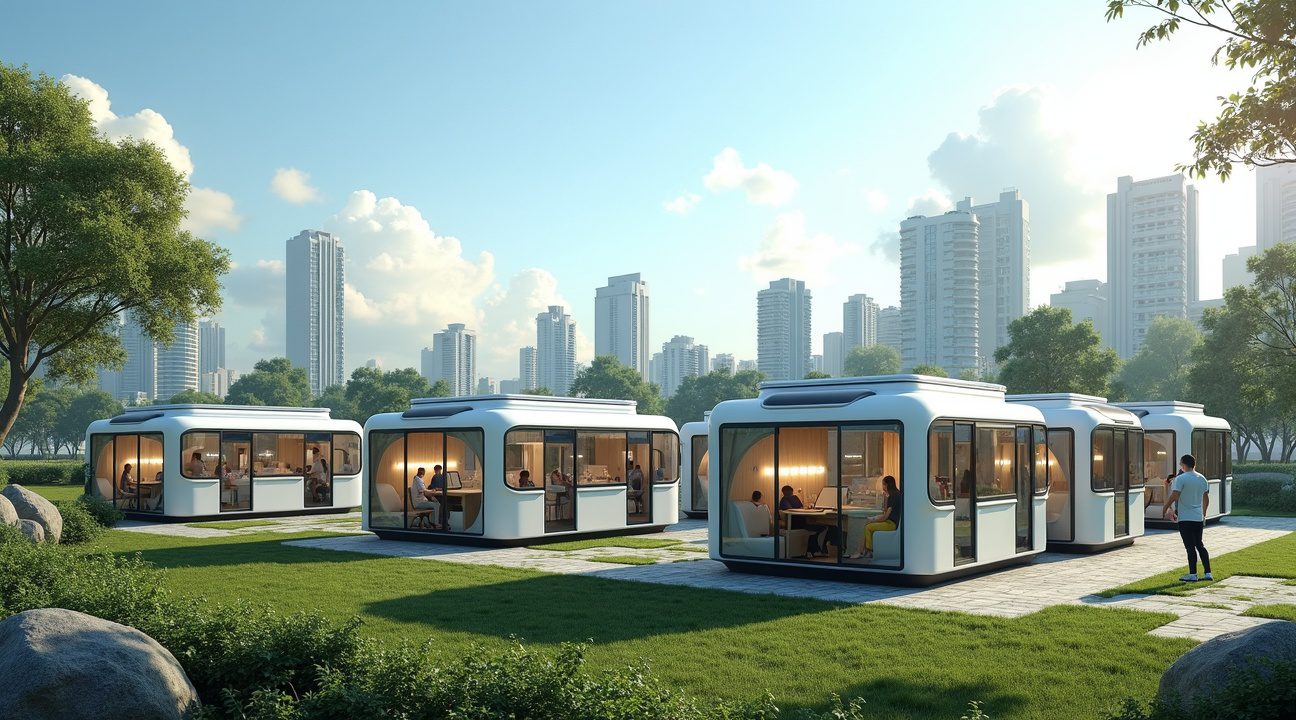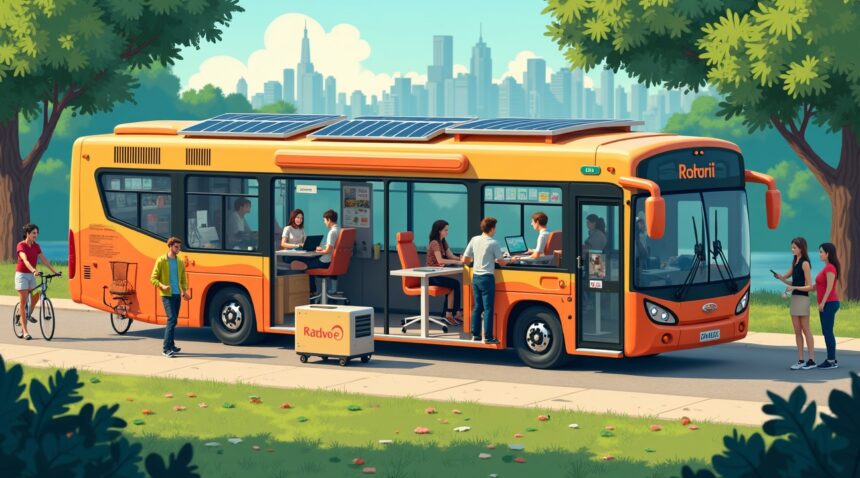Brazil has pioneered an innovative urban solution by converting decommissioned public buses into solar-powered micro offices equipped with WiFi and air conditioning, strategically placed throughout urban parks.
Key Takeaways
- Solar-powered workspace solution: Retired buses transform into fully functional offices with rooftop solar panels providing clean energy for air conditioning, WiFi, LED lighting, and charging stations throughout standard working hours.
- Strategic park placement: The converted buses position themselves in urban parks to create productive work environments surrounded by nature while activating underutilized public spaces during business hours.
- Economic accessibility: These work pods eliminate financial barriers to professional workspace access, providing freelancers and entrepreneurs with climate-controlled offices at no cost compared to expensive traditional coworking spaces.
- Environmental innovation: The project demonstrates circular economy principles by extending bus lifecycles, reducing landfill waste, and promoting renewable energy adoption while creating carbon-neutral workspace solutions.
- Scalable urban model: Building on Brazil’s extensive bus infrastructure expertise, this cost-effective approach offers cities worldwide a practical alternative to expensive office construction that supports remote work culture and sustainable urban development.
For more details on sustainable urban development approaches like this, visit the World Economic Forum article on Brazil’s solar bus office initiative.
From Discarded Fleet to Digital Workspace: How Brazil Transforms Buses into Solar-Powered Offices
Brazil’s innovative approach to urban workspace creation transforms decommissioned public transportation vehicles into fully functional solar-powered micro offices. These converted buses represent a clever fusion of sustainability and modern work culture, addressing both environmental concerns and the growing demand for flexible workspace solutions.
Innovative Bus Conversion Technology
Each retired bus undergoes a comprehensive transformation that turns aging public transport into cutting-edge workspace. Solar panels mounted on the roof harness Brazil’s abundant sunshine to generate clean energy for all onboard systems. The converted vehicles feature complete climate control systems, high-speed WiFi connectivity, and comfortable seating arrangements designed specifically for laptop users and digital professionals.
I find the engineering approach particularly impressive, as these conversions maintain the bus’s structural integrity while completely reimagining its interior function. The solar panel array typically generates enough power to run air conditioning, LED lighting, charging stations, and internet equipment throughout standard working hours. Battery storage systems ensure continuous operation even during cloudy periods or extended use.
Supporting Modern Work Culture
These work pods cater directly to Brazil’s expanding remote workforce and entrepreneurial community. Freelancers, remote employees, and small business owners can access professional workspace without traditional office overhead costs. The strategic placement in urban parks creates an environment that blends productivity with natural surroundings.
The concept aligns perfectly with post-pandemic work preferences, where professionals seek alternatives to both home offices and expensive coworking spaces. Users can book time slots through mobile applications, making these solar-powered offices accessible on-demand. The initiative also supports local economic development by providing entrepreneurs and small businesses with affordable access to professional workspace infrastructure.
This creative repurposing demonstrates how cities can address multiple challenges simultaneously:
- Reducing waste from retired public transportation
- Expanding workspace options
- Promoting renewable energy adoption
The program showcases Brazil’s commitment to sustainable urban development while acknowledging the practical needs of its evolving workforce. Each converted bus extends the lifecycle of public infrastructure while serving an entirely new purpose in supporting economic activity and environmental responsibility.

Green Spaces Meet Remote Work: Strategic Placement in Urban Parks
I find Brazil’s approach to integrating work pods within urban parks represents a revolutionary shift in how cities think about public space utilization. These converted bus offices aren’t randomly scattered throughout park systems – they’re positioned with careful consideration for both worker productivity and environmental harmony.
Creating Productive Sanctuaries in Natural Settings
Parks have traditionally served as recreational escapes from urban hustle, but these solar-powered work pods expand that purpose dramatically. I observe that workers can now access quiet, inspiring environments surrounded by trees and open space while maintaining full connectivity through integrated wifi systems. The air conditioning ensures comfort during Brazil’s warmer months, making these outdoor offices viable year-round workspace alternatives.
This strategic positioning creates natural sound barriers between work zones and recreational areas. Unlike cramped coffee shops or noisy co-working spaces, these park-based offices offer expansive views and fresh air circulation that can significantly boost creativity and reduce stress levels. The scenic surroundings provide mental breaks that traditional office environments simply can’t match.
Transforming Public Spaces into Economic Engines
This initiative represents a fundamental reimagining of how public infrastructure can serve multiple community needs simultaneously. I notice that these work pods activate previously underutilized park areas during business hours, creating vibrant hubs of professional activity alongside traditional recreational uses.
The placement strategy encourages several positive behavioral changes:
- Workers choose walking or cycling over driving to reach these park offices
- Local businesses near parks experience increased foot traffic from remote workers
- Community members discover new park areas they might not have visited previously
- Property values in neighborhoods with these amenities often see positive impacts
- Public safety improves through increased daytime park usage
Beyond individual productivity benefits, I see this model creating stronger connections between work life and environmental consciousness. When people spend their workdays immersed in green spaces, they develop deeper appreciation for urban forestry and conservation efforts. This daily exposure to nature can influence personal choices about sustainability and community engagement.
The economic ripple effects extend well beyond the immediate work pod users. Food vendors, bike shops, and local cafes positioned near these enhanced parks often report increased business. Innovation in urban transportation pairs naturally with these workspace innovations, as cities explore new ways to connect these distributed work hubs efficiently.
I recognize that this multifunctional approach to public space challenges traditional urban planning boundaries. Parks become economic incubators while maintaining their environmental and recreational value. The solar power systems demonstrate how sustainable technology can support both environmental goals and practical business needs without compromising either objective.
These strategically placed work pods also address urban density challenges by distributing professional activity across wider geographic areas. Instead of concentrating all office workers in central business districts, this model spreads economic activity throughout residential neighborhoods. This distribution reduces transportation strain while bringing professional energy directly into community spaces.
The success of this program depends heavily on thoughtful integration with existing park ecosystems. I observe that successful installations maintain clear sight lines for security while preserving natural landscaping features. The converted buses blend into park environments through thoughtful color schemes and positioning that respects both aesthetic and functional considerations.
This Brazilian innovation demonstrates how retired infrastructure can gain new purpose while serving evolving urban needs. The transformation of decommissioned public transportation vehicles into productive workspace solutions exemplifies circular economy principles in action, extending equipment lifecycles while addressing contemporary remote work demands.
Breaking Down Economic Barriers to Professional Workspace Access
These transformed bus offices address one of Brazil’s most pressing urban challenges: the high cost of professional workspace access. Traditional office rentals in major cities like São Paulo and Rio de Janeiro can consume up to 40% of a freelancer’s monthly income, making professional environments virtually impossible for many entrepreneurs and remote workers to afford.
Bridging the Digital Divide Through Strategic Placement
The solar-powered micro offices tackle digital inequality head-on by providing reliable internet connectivity in areas where consistent access remains sporadic. I’ve observed how these units specifically target neighborhoods where broadband infrastructure lags behind urban development, offering speeds comparable to premium coworking spaces at no cost to users. Each converted bus features enterprise-grade WiFi systems powered entirely by rooftop solar panels, ensuring uninterrupted connectivity even during peak usage hours.
The initiative creates immediate economic opportunities across multiple sectors:
- Local technicians gain employment maintaining the solar systems and WiFi networks.
- Nearby vendors benefit from increased foot traffic as professionals frequent parks for work sessions.
- Food trucks and coffee stands often position themselves near these mobile offices, creating mini business ecosystems that didn’t exist before.
Public-private partnerships drive the program’s expansion beyond initial pilot phases. City governments provide the retired buses and permit usage in public parks, while telecommunications companies contribute internet infrastructure and ongoing connectivity services. Solar technology firms supply the renewable energy systems, often viewing the project as a showcase for their capabilities in urban sustainability solutions.
The model’s scalability becomes apparent when examining user adoption rates. Each converted bus serves approximately 15–20 professionals daily, generating enough demand to justify expansion into additional neighborhoods. Users book time slots through mobile apps, creating predictable usage patterns that help cities determine optimal placement locations for new units.
Financial barriers that once prevented skilled workers from accessing professional environments are systematically eliminated through this approach. Graphic designers, consultants, and digital marketers who previously worked from cramped apartments or noisy cafes now have access to climate-controlled spaces with reliable power and internet. The air conditioning systems, also solar-powered, maintain comfortable working temperatures year-round, addressing Brazil’s challenging tropical climate conditions.
These workspace solutions particularly benefit women entrepreneurs and single parents who need flexible, safe working environments during non-traditional hours. Park settings provide security through natural foot traffic while offering the professional atmosphere necessary for client meetings and video conferences. The transformation represents more than just workspace provision—it demonstrates how creative urban planning can democratize access to economic opportunities through innovative reuse of existing infrastructure.
Environmental Innovation Through Circular Economy and Renewable Energy
I observe Brazil’s innovative bus transformation project delivering substantial environmental benefits through its integration of solar technology and circular economy principles. Solar panels mounted on these converted work pods dramatically cut carbon emissions compared to traditional office buildings that rely heavily on grid electricity sourced from fossil fuels. The clean energy approach eliminates dependency on conventional power sources, creating carbon-neutral workspace solutions that operate independently within urban park settings.
The project extends the operational lifespan of decommissioned buses that would otherwise contribute to landfill waste or require resource-intensive recycling processes. Instead of scrapping these vehicles, Brazilian innovators transform them into functional workspaces, demonstrating how transportation technology can evolve beyond its original purpose. This approach prevents thousands of pounds of metal, plastic, and other materials from entering waste streams while creating valuable urban infrastructure.
Circular Economy Benefits and Urban Recycling Impact
These solar-powered work pods represent several key circular economy advantages that cities worldwide can replicate:
- Material conservation through vehicle repurposing rather than disposal
- Reduced manufacturing demand for new office construction materials
- Lower transportation emissions from hauling construction supplies
- Decreased urban waste generation from demolished bus fleets
- Extended product lifecycles that maximize initial resource investments
The initiative demonstrates how environmental innovation becomes integral to urban planning strategies rather than an afterthought. Cities gain functional workspace capacity while simultaneously addressing sustainability goals through creative infrastructure solutions. The work pods showcase green mobility advancements by proving that transportation assets can serve multiple purposes throughout their extended lifecycles.
I find this approach particularly effective because it addresses multiple environmental challenges simultaneously. The project tackles urban waste reduction, renewable energy adoption, and sustainable workspace development through a single integrated solution. Brazilian planners have created a model that other municipalities can adapt based on their specific urban contexts and available decommissioned vehicle fleets.
The environmental impact extends beyond individual work pods to influence broader sustainability strategies within urban environments. Parks hosting these solar-powered offices become demonstration sites for clean energy technology while providing residents with tangible examples of circular economy principles in action. This visibility helps normalize sustainable practices and encourages community adoption of similar environmental innovations.
Cities implementing comparable programs can expect measurable reductions in construction waste, energy consumption, and carbon emissions associated with traditional office development. The Brazilian model proves that environmental responsibility and functional urban infrastructure can coexist effectively when innovative thinking guides municipal planning decisions.
Brazil’s Bus-Centric Urban Infrastructure Creates Perfect Foundation for Innovation
Brazil’s extensive bus network serves as the lifeline for millions of urban dwellers, processing more than sixty million trips daily across an urban population of approximately 110 million people. This massive scale creates an ideal ecosystem for innovative repurposing projects like solar-powered work pods.
Buses Dominate Brazilian Urban Transportation
In major metropolitan areas like Rio de Janeiro, buses handle an impressive 80% of all motorized trips, making them the undisputed backbone of urban mobility. This heavy reliance on bus transportation means Brazilian cities maintain large fleets that require regular vehicle turnover, creating a steady supply of retired buses available for creative transformation projects.
Brazilian transit authorities operate full-sized buses exceeding 40 feet in length, each designed to accommodate up to 85 passengers during peak hours. These spacious vehicles provide ample interior room for conversion into comfortable work environments. The generous dimensions allow for creative layouts that can include multiple workstations, meeting areas, and essential amenities without compromising functionality.
Modern Fleet Characteristics Support Sustainable Conversion
Brazilian bus fleets maintain relatively young vehicle ages, averaging less than three years old. This modern infrastructure ensures that retired buses entering the conversion pipeline retain structural integrity and contemporary features that facilitate easier transformation into work pods.
Recent vehicles come equipped with electrical systems compatible with solar panel installations and climate control modifications. Their newer engines and mechanical systems reduce conversion costs while providing reliable platforms for sustainable office solutions. Advanced electrical architectures in these buses simplify the integration of Wi-Fi systems, LED lighting, and energy-efficient air conditioning units.
The combination of large vehicle dimensions, modern mechanical systems, and high fleet turnover rates positions Brazil perfectly for scaling work pod initiatives across multiple cities. Municipal planners can leverage existing bus infrastructure knowledge and maintenance capabilities to support these innovative urban workspace solutions. Cities already familiar with managing large vehicle fleets possess the operational expertise needed to maintain and deploy converted bus work pods effectively throughout urban park systems.
This transportation-focused foundation enables Brazil to transform what might seem like a futuristic concept into a practical reality that addresses both urban workspace shortages and sustainable transportation goals simultaneously.

Building on Curitiba’s Legacy: Cost-Effective Urban Solutions with Global Impact
Brazil’s innovative approach to transforming retired buses into solar-powered work pods represents a natural evolution of the country’s expertise in bus-based urban solutions. This transformation builds directly on decades of experience that have proven buses offer remarkable cost advantages over traditional heavy rail infrastructure. While subway and light rail systems demand investments between $20 and $100 million per mile, buses deliver equivalent capacity for approximately $5 million per mile.
The financial success of Brazil’s urban bus networks provides a strong foundation for these new work pod initiatives. The existing urban bus system generates positive net revenues exceeding $3 billion annually, with private operators frequently managing these systems profitably. This proven economic model demonstrates Brazil’s ability to create sustainable, revenue-generating urban infrastructure that doesn’t burden taxpayers.
The Global Influence of Brazilian Bus Innovation
The work pod concept continues the remarkable legacy of Curitiba’s Bus Rapid Transit model, which has become a global phenomenon since its inception. Today, BRT systems inspired by Curitiba’s design operate in 21 cities worldwide, spanning 789 kilometers of dedicated routes and serving over 10.6 million daily passengers. This widespread adoption validates Brazil’s leadership in creative urban mobility solutions.
The transition from active transit buses to stationary work pods showcases Brazil’s commitment to maximizing infrastructure value throughout its entire lifecycle. Rather than scrapping retired vehicles, this approach extends their useful life while addressing modern urban challenges like remote work accommodation and digital connectivity in public spaces. The solar power integration reflects Brazil’s growing expertise in renewable energy applications, while the placement in urban parks creates new community gathering spaces that blend work, nature, and technology.
This cost-effective model offers developing cities an alternative path to urban innovation that doesn’t require massive capital investments. Just as the flying car makes its debut in transportation innovation, Brazil’s work pods represent a practical, immediately implementable solution that other cities can adapt to their specific needs and budgets.
Sources:
Brazil’s Buses: Simply Successful, Aaron Golub, ACCESS Magazine, Spring 2004
Seizing Brazil’s Urban Opportunity, Coalition for Urban Transitions, Global Report (October 2021)


